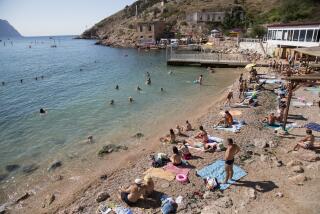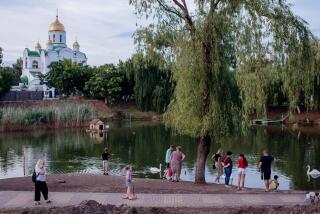Once Isolated, Russia’s Western Naval Beachhead Begins to Blossom
- Share via
KALININGRAD, Russia — Against the backdrop of the crumbling brick and concrete edifices of this Cold War outpost, the boisterous new beer gardens and sidewalk cafes shaded by crayon-colored umbrellas look like hot-air balloons blown off course and haplessly landed.
At the edge of town, the rusty workshops of the Yantar shipyards have sprung back to life after a five-year slowdown to turn out shiny new sedans in the place of menacing warships.
Out a little farther, along the white-sand Baltic Sea beaches, the region’s first resort built to international standards is due to open in September, and turn-of-the-century cottages are getting spruced up to shelter the steady droves of German tourists.
It has taken 50 years, but the persevering offspring of Siberians sent to populate this long-closed corner of Russia are finally finding something to savor from the spoils of the Great Patriotic War.
Kaliningrad still has far to go to recover its pre-World War II splendor as Koenigsberg, the capital of East Prussia, but the western exclave inherited by the Soviet Union and fitted out as a naval fortress is beginning to blossom now that it is out of isolation.
It was the only territorial aggrandizement of Russia in recognition of this country’s role in defeating Nazi Germany, and for five decades the displaced veterans and prisoners brought in to inhabit the homes of expelled Prussians felt that they had simply left one bleak existence for another.
But today a sense of belonging has taken root among Kaliningraders; few look wistfully toward their wealthier western neighbors or fearfully at the former brother Baltic states whose independence makes their own refuge an island.
Far from feeling marooned more than 200 miles from the Russian mainland, beyond Lithuania and Belarus, the 1 million residents of this western beachhead seem to revel in their remoteness.
“We have to start seeing ourselves not as cut off from Russia but as in the middle of a changing region. This provides opportunities,” says Andrei V. Kubanov, chairman of the board of directors for Investbank. “Kaliningrad is the only year-round port in European Russia, and we can develop it into a going concern if we compete with our neighbors.”
Unemployment here is lower than elsewhere in Russia, and most of those officially registered as jobless are busy taking advantage of the region’s special tax-free status to shuttle in consumer goods for sale to the mainland.
*
As a designated Special Economic Zone, Kaliningrad is fashioning itself as the Hong Kong of the Baltics, able to set its own priorities in trade and transport, cut its own deals with newly independent neighbors and act as an offshore haven for Russian business.
Talk of courting reunification with Germany or breaking free of faraway Moscow has ceased after five years of political uncertainty, leaving this region firmly tethered to Mother Russia.
“True, our history was German, but this is part of Russia now,” says Sergei Y. Tsyplenkov, director of the Sociological Center that carries out research projects for academic institutions and potential investors. “We have monuments to [philosopher Immanuel] Kant and [dramatist Friedrich von] Schiller, but there is no reason why the past and the present cannot coexist here.”
Indeed, a German atmosphere is unabashedly exuded in the region.
Advertisements and shop signs are often lettered in both Russian and German, and the cuisine in newly opened eateries is clearly aimed at the visiting Prussians nostalgic for a glimpse of their lost native land.
“This is the only material gain Russia got for its efforts in World War II. No one could imagine it being handed back, especially if life can be brought to some semblance of normal,” says Leonid P. Gorbenko, director of the fisheries port and a strong challenger in next month’s gubernatorial election.
No longer intimidated by the seven centuries of German rule that preceded their 1945 conquest, the Russian masters of this Baltic Sea statelet have finally begun restoring old Koenigsberg’s ruined cathedral and erecting tributes to famous Prussian cultural figures like Kant.
But proposals to rename this city Koenigsberg have ceased being put forward, as Kaliningraders bristle at the notion of giving up their Russian identity, even if it is tied to a discredited Stalinist figure.
“The problem of reverting to our historical name is very complicated here. Whoever heard of a place being named for people who were expelled and are no longer citizens of the region?” asks Alexander G. Khmurchik, editor of the newspaper Kaliningradskaya Pravda. “People have begun to realize that this craze for renaming everything seldom brings anything good.”
That said, attracting German tourists is one of the more promising prospects for Kaliningrad, because its status as a closed military stronghold spared it much of the pollution and reckless development that afflicted the interior of Russia.
Kaliningrad has become a major center for used-car trading, because local residents can bring in vehicles duty-free and then resell them to mainland residents in an untaxed domestic transaction.
The city has also become Russia’s first new post-Soviet auto-making center, with a $1-billion investment by Kia Motors--South Korea’s second-largest car maker--for construction of 55,000 compacts a year due to start rolling off the assembly line in October.
*
Cooperative deals have been struck with Lithuania and Belarus for transporting goods by rail to the Russian interior, and those links are being augmented by expanding Baltic Sea cargo traffic and road-building projects to connect Moscow with Baltic capitals and Western Europe, Kaliningrad Gov. Yuri S. Matochkin says.
The post-Communist business people who have gained sway here say re-creating a regional trade network like the medieval Hanseatic League should be a priority for a region so balkanized by new borders.
One recent proposal to build a highway from Kaliningrad through eastern Poland to Belarus got a swift rebuff from Warsaw as ecologically and politically unacceptable. But local movers and shakers seem reluctant to take no for an answer.
“No one has categorically rejected the project--it just was proposed awkwardly during our presidential elections,” says Alexander G. Luchinin, marketing director for TransRail West, the largest trucking agency in western Russia. “Sooner or later all of our neighbors will see the advantage of intensifying international movements.”
Wedged between the independent Baltic states and Poland, Kaliningraders could be expected to be shuddering over the prospect of North Atlantic Treaty Organization enlargement.
But the possibility of NATO troops and armaments on their borders produces little more here than the occasional shrug among many Kaliningraders.
“What do we have to fear from NATO? We’ve lived through everything already, what with war and poverty and perestroika,” says Vladimir D. Konyukhov, a retired merchant marine brought here at age 4 by his uprooted Siberian parents. “Let NATO troops come if they want to. Let the Germans invest here. We can handle anything the future brings.”
Officials in Kaliningrad, as the forward flank of Russia’s shifting empire, seem to have quickly embraced a new official line being touted in Moscow that NATO expansion is more a risk for the alliance than for Russia.
“NATO should realize that the problem is strictly financial. To bring up the equipment and military standards of Eastern Europe to alliance standards will cause the bankruptcy of NATO,” insists Capt. Anatoly V. Lobsky, spokesman for the Baltic Sea Fleet headquarters here.
But those in uniform remain vocally opposed to the expansion, noting that Russia has been demilitarizing and would have to reconsider those moves if NATO edges eastward.
Funding for the fleet has shrunk to half its Soviet-era level, and the number of warships in the region is one-third of its superpower strength, Lobsky says.
*
Indeed, the streets of Kaliningrad now look no more militarized than those in any other Russian garrison town, with the shady wheelers and dealers of the capitalist era far outnumbering those in uniform.
That has helped foster a climate conducive to luring foreign investment, which only a few years ago was regarded as a capitalist conspiracy to rob Russia.
Aside from the South Korean car production, the Yantar shipbuilding works has begun turning out metal trailers for construction offices and temporary housing, as well as the vendors’ kiosks proliferating on streets across Russia.
More to Read
Sign up for Essential California
The most important California stories and recommendations in your inbox every morning.
You may occasionally receive promotional content from the Los Angeles Times.











